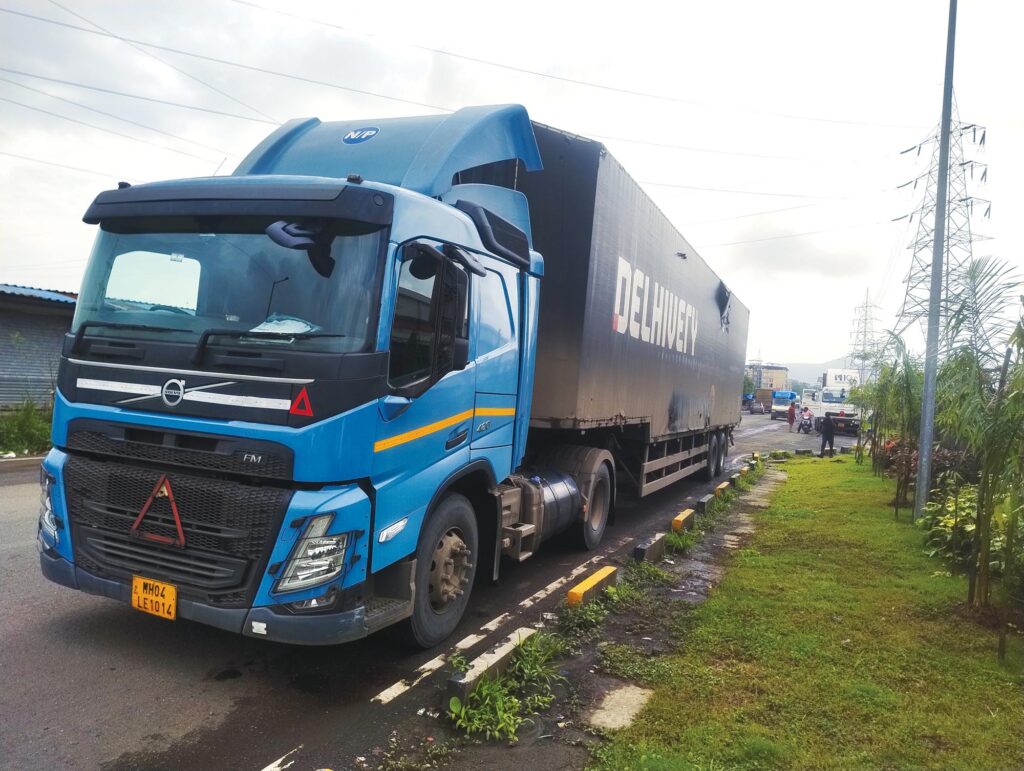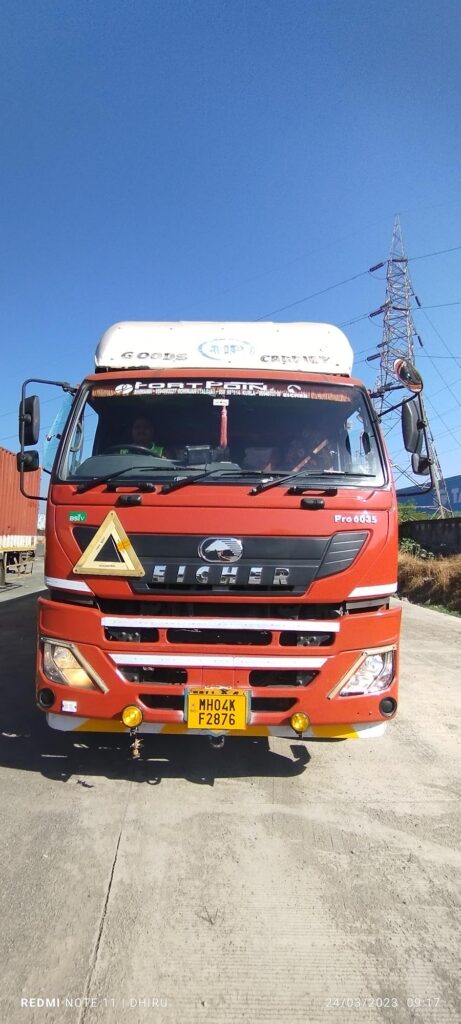
B. D. Dhalla Transport Pvt. Ltd. is making a significant impact in the Indian logistics sector with its practical approach to fleet management, safety, and operational efficiency. Rajesh Rajgor recently spoke with Jehaan B. Dhalla, Director of the company, to understand their current operations, strategic choices, and future ambitions.
B. D. Dhalla Transport Pvt. Ltd. stands out as a pioneering force in the Indian logistics industry, renowned for its commitment to innovation, safety, and operational excellence. Jehaan B. Dhalla, Director of the company, is the fourth generation of the family to enter the business and offers an in-depth look into their current operations and future aspirations. The company has been in the logistics sector for close to 70 years, currently operating a fleet of around 120 vehicles, which is dynamic and adjusts based on demand and operational requirements.
The fleet includes roughly 40 tractor units, mainly from Volvo and Bharat Benz, and about 80 rigid vehicles of various tonnage capacities from the stable of Eicher. A distinctive feature of their strategy is the choice not to own trailers. Instead, they concentrate on prime movers while clients provide the trailers as needed. This model allows for greater flexibility and responsiveness to client needs, avoiding the capital costs and logistical complexities of trailer ownership.

The company excels in daily intra-city and local deliveries, efficiently serving some of India’s top lubricant, frozen foods, FMCG and e-commerce companies. Their extensive experience enables them to foresee and address potential delays, ensuring that transport is timely and reliable. “Our expertise allows us to anticipate and overcome challenges, keeping our clients’ promises intact,” says Jehaan.
Their express cargo services guarantee on-time delivery, while their fleet of refrigerated vehicles caters to temperature-sensitive goods. With meticulous temperature control and well-maintained vehicles, they ensure that perishables remain in optimal condition. “We maintain rigorous standards to prevent any issues that might affect the quality of the cargo,” he adds.
B. D. Dhalla also has experience in operating in remote and challenging terrains, including deserts and hilly areas. Their experienced drivers and specialized fleet are adept at navigating these difficult routes. They are a key transporter for multinational corporations in the oil and lubricants sector. “From rugged terrains to bulk shipments, our team is equipped to handle diverse transport needs efficiently,”

Innovation, Fleet Management, and Safety
“Our goal is not just to meet industry standards but to set them,” Jehaan opens up. With extensive experience in the logistics industry, the company is dedicated to leading rather than just participating. They have developed innovative solutions to tackle the challenges of India’s diverse geography and labor market, often adopting new technologies more quickly than many of their international counterparts.
For instance, B. D. Dhalla Transport was among the early adopters of advanced telematics systems in their fleet, and more recently in the implementation of AI enabled cameras. These systems provide real-time data on vehicle performance, fuel consumption, and driver behavior and on-road risks allowing the company to optimize routes, reduce fuel costs, and enhance safety. “While many global logistics companies were still considering the implementation of technology, we had already integrated it into our daily operations, giving us a competitive edge in management, efficiency and reliability,” states, Jehaan.

When it comes to managing their fleet, the emphasis is on quality rather than sheer numbers. “While our fleet size might seem modest compared to some competitors, the efficiency and value of our vehicles are much higher than the industry standard,” he shares. This approach ensures that each vehicle is optimized for performance, which supports steady growth despite a lean fleet size. The focus is on maximizing the potential of each human resource and vehicle rather than expanding the fleet indiscriminately.
Safety is another cornerstone of the company’s operations. “Effective safety management means fewer road accidents, which we consider a significant achievement,” he emphasises. With one of their more safety conscious clients, they have accumulated over 30 million kilometers of transportation, often in challenging and remote areas, while maintaining an impeccable safety record of zero incidents. This success is due to rigorous safety audits, continual driver training and engagement by a dedicated safety team, and a culture of continuous vigilance and improvement.
Looking ahead, B. D. Dhalla Transport plans to expand its fleet with heavier vehicles, targeting sectors like e-commerce and lubricants. “We have developed processes that enhance operational efficiency, which have earned us recognition from several major clients in the e-commerce and lubricant sector for our focus on performance and road safety,” he adds. Their commitment to refining processes and improving efficiency is a key factor to their established reputation within the industry.
Managing Costs, and Fostering Driver Trust
Fuel cost management is another critical area. Jehaan outlines two main strategies: closely monitoring fuel usage and fixing costs with drivers. “Continuously monitoring fuel usage can be challenging due to data accuracy and recurring friction with the drivers. Instead, we spend great efforts in accurately `understanding fuel dynamics on the routes we take up, and then provide drivers with marginally more fuel than needed for a trip, to allow them to keep increasing their earnings by improving their driving practices,” he explains. This method not only promotes efficient driving but also helps reduce the need to waste man-hours monitoring fuel theft.
On the topic of alternative fuel, Jehaan provides practical insights. He explains that LNG (liquefied natural gas) could offer cost advantages if prices remain stable, but these benefits could become visible and tangible only later in the asset’s life. “Initially, LNG can be more expensive than diesel due to higher upfront costs,” he says. He also points out challenges with LNG quality, especially in maintaining the correct temperature at the point of storage and supply, but expects improvements as the supply stabilizes. Despite these challenges, the company remains open to exploring new fuel options, such as hydrogen.
Electric vehicles, while promising for local use, are not yet ideal for long-haul transportation in India. “Given our reliance on thermal power for electricity, electric vehicles might not be cost-effective or environmentally friendly in the current scenario,” Jehaan observes. However, he is optimistic about the potential of hydrogen fuel. “Hydrogen has significant potential in theory, and we’re keen to explore it when the opportunity presents itself” he shares. This forward-looking perspective reflects the company’s commitment to embracing new technologies while addressing current limitations.
Maintaining strong relationships with drivers is also essential. “Respect and fair compensation are key to retaining our employees,” Jehaan points out. While the potential for fuel theft remains a concern in certain segments of the overall operation, he believes addressing it through fair compensation and open dialogue is more effective than relying solely on technology. Their proactive approach to driver training and development has to be noted.
Recognizing the unique challenges posed by India’s diverse terrain—from congested urban areas to remote rural roads—the team developed a comprehensive training program tailored to these conditions for the drivers. This program includes simulations of difficult driving scenarios, regular safety audits, mock emergency drills and ongoing skill development sessions. This focus on driver education not only improves safety but also enhances the overall quality of service, as drivers are better equipped to handle unexpected challenges on the road.
Strategic Contracts and Specialized Vehicles Drive Efficiency
For route planning and operational efficiency, B. D. Dhalla Transport uses two-way contracts to minimize idle time. “Two-way contracts help ensure that vehicles are continuously in use, reducing downtime,” Jehaan says. For routes without return loads, the company leverages available market contacts to find backhauls and keep their vehicles moving. This approach maximizes fleet utilization and minimizes idle time. He also advocates for better data on toll costs and border charges. “Currently, accurate toll information is fragmented, leading to inefficiencies in understanding the overall cost ecosystem of logistics in the country” he notes. He calls for a more transparent and accessible system to help transporters provide accurate cost estimates and improve operational cost efficiency. “Until we as transporters are able to have a full picture of all the costs involved in operating vehicles from any origin to destination within our country, we will not be able to move the industry to a point where freights are optimized based on logic and sustainability of costs, rather than negotiation and prevailing market forces.”
Looking to the future, B. D. Dhalla Transport plans to grow its fleet organically while picking up strategic forward-thinking clients along the way. The focus will be on improving road safety, enhancing driver skills, using the highest technology in trucks available and finding the most effective fuel options to pass on the best costs and performance to the clients. “Our goal is to continually refine our operations, enhance driver satisfaction also as a tool of retention, and stay ahead in the evolving logistics landscape,” Jehaan concludes.
By integrating traditional practices with innovative strategies, the company is well-positioned to lead in India’s logistics sector. Jehaan’s insights provide a clear view of how they address the challenges of modern transportation while preparing for future advancements. Their focus on quality, safety and efficiency emphasises their commitment to setting industry standards and driving progress in the logistics sector.